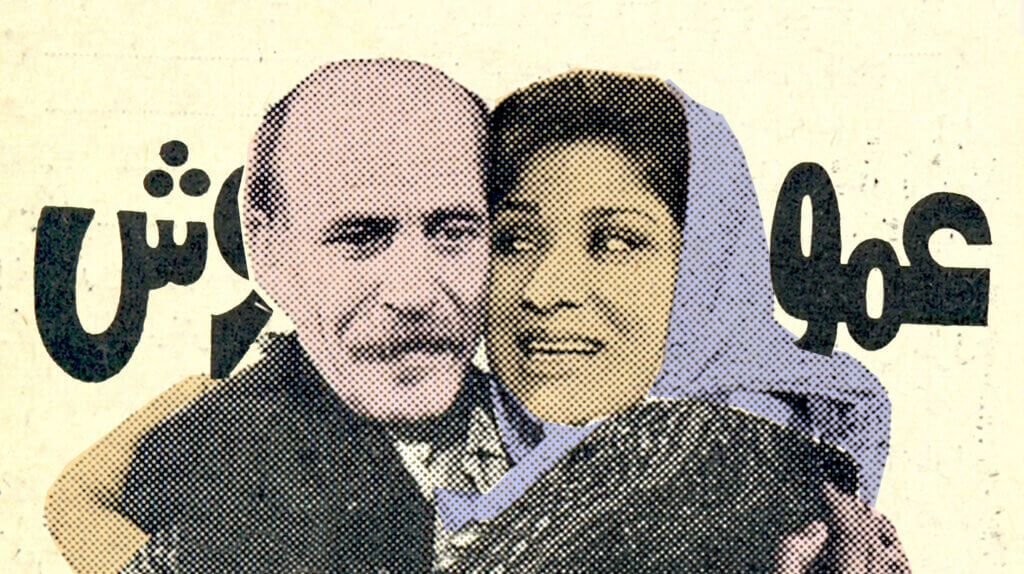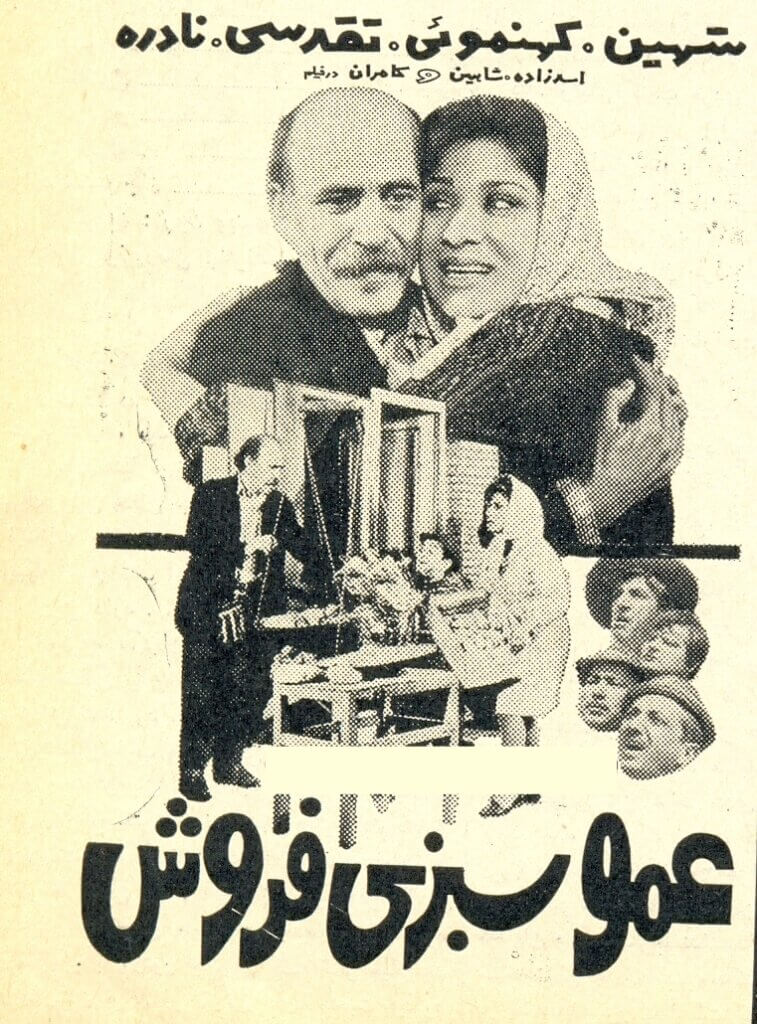
You might have uncles, and you might have aunties. Iranians, however, have uncles, and they have uncles, and they have non-uncle uncles. This is because the titles given, differ, depending on the relation. Although this is not unique to Iran, there are many uniquely Iranian things that the world needs to know about Iranian aunts and uncles. What are they? Like any good Iranian uncle, we attempt to get deep into things.
In this episode, we discuss the Persian words for aunts and uncles — yes, all 14* varieties! We also let you know why Iranians have different feelings towards their aunts and uncles, depending on if they are your mother or father’s sibling. As if that wasn’t enough, we get into the good, the bad and the ugly Persian terms that involve Iranian aunts and uncles.
A word of warning before you listen
We believe that comedy can help highlight disturbing topics by helping bring about awareness, and subsequent change for the better. In this episode we tackle one of the more disturbing ones: that of child abuse. We’ve heard anecdotal evidence of such happenings, and elude to this during our conversation. We conclude the conversations about this with a warning to those that might fall prey to such horrors. It goes without saying that we find such crimes against children abhorrent.
*Listen to learn where the extra 4 come from.
Questions we also get answers to in this episode
- What is the Persian (Farsi) word for uncle?
- Why are some Iranian aunts and uncles more important?
- What is the Persian (Farsi) word for aunt
- How many words are there for aunt and uncle in Persian (Farsi)?
- Why do Iranian uncles and aunts answer you with their own title?
- How do you say aunt and uncle in Persian (Farsi)?
- Why is a Dāi better than an Amoo?
- What Persian (Farsi) phrases, idioms or terms use aunt or uncle?
- Why is a Khāleh better than an Ammeh?
- What are the gender neutral terms for aunt and uncle?
- Who is Amoo Sabzi Foroosh?
- What Persian (Farsi) phrases use aunt or uncle?
- Are there gender neutral terms for the words aunt and uncle?
List of the different types and titles for Iranian aunts and uncles
| Relation | English | Pingilish | Persian (Farsi) |
|---|---|---|---|
| Mother’s sister | Aunt | Khāleh | خاله |
| Mother’s brother | Uncle | Dāi | دایی |
| Father’s sister | Aunt | Am.meh | عمه |
| Father’s brother | Uncle | Amoo | عمو |
| Mother’s brother’s wife | Aunt | Zan Dāi | زن دایی |
| Mother’s sister’s husband | Uncle | Shohar Khāleh | شوهر خاله |
| Father’s brother’s wife | Aunt | Zan Amoo | زن عمو |
| Father’s sister’s husband | Uncle | Shohar Am.meh | شوهر عمه |
| Honourary aunt | Aunt | Khāleh | خاله |
| Honourary uncle | Uncle | Amoo | عمه |
List of Persian (Farsi) terms or phrases with the words aunt or uncle in
Like with any language, there are many Persian (Farsi) phrases, idioms and terms with the words uncle or aunt in. We’ve listed a few of these below. If you know of any more, we’d love to hear them. Please add your additions in the comments below.
- “(Mage injā) khuneh-ye khālast” — “(like this is) your aunt’s home”, a response to somebody being too relaxed in a person’s home
- “Ammateh!” — “your auntie!”, like the American “Your mamma!”
- “Doosti-ye khāleh kherseh” — when someone does harm with good intention
- “Āsh kashk-eh khālat-eh, bokhori pāt-eh, nakhori pāt-eh” — “This is the āsh your aunt has prepared, it’s yours whether you eat it or not”, when you have no choice but to do or go through something, whether you want to or not
- “Beh dard e Ammat mikhoreh” — “it’s worthy of your aunt”, meaning useless or of low quality
- “Khāleh zanak” — a term implying gossip
- “Khāleh khāye dār” — “auntie with testicles”, a man who is hanging-out with women, gossiping
List of famous Iranian uncles
We’ve listed a few famous Iranian uncles, below. Let us know in the comments, who we’ve missed.
- Amoo Ganād — A kids’ TV show host on IRIB
- Amoo Hooshang — a famous restauranteur in Tehran
- Ammeh Katty — A fictional character from a Mehran Modiri TV show, Pā-varchin
- Amoo Sabzi Foroosh — named in the song (see below)
- Amoo Yādegar — A folk story and an Iranian TV show in the 60s
- Amoo Zanjirbāf — An Iranian kids’ game and a character from an Ahmad Shamlou poem
- Ali Dāi — Iranian footballer and coach
- Dāi Jān Nāpel’one — the main character from the TV series, My Uncle Napoleon
List of famous Iranian aunts
We’ve listed a few famous Iranian aunts, below. Let us know in the comments, who we’ve missed.
- Khāleh kherseh — A bear, in a Persian folk story that, kills a fly, sitting on her human friend’s face with a huge rock, killing him while he’s sleeping
- Khāleh Shādooneh — An IRIB kids’ show host
- Khāleh Sooskeh — A Persian folk story
English translation of the song lyrics for Amoo Sabzi Foroosh (Uncle Vegetable Seller)

According to Wikipedia, Uncle Vegetable Seller is the name of a play that was performed in a folk and non-professional way in women’s homes and gatherings. The original song is featured in a play, and is set in a vegetable shop. During the song, two characters tell the story of a woman’s love and secret and need for a vegetable seller.
This song, or poem, has been performed by Jalal Hemmati (listen to our podcast episode about his amazing song, Mahvash, Parivash) and Parivash Sotoudeh and parts of it have been performed by Hamed Hakan.
Amoo Sabzi Foroosh song structure
The song relies on audience participation. The singer will do the hard part and the audience will simply respond with “yes”. The general structure of the song is outlined below and will repeat, but with different innuendos. Follow the table below to learn parts 5 to 7.
- Singer: “Amoo Sabzi Foroosh?” — “Uncle Vegetable Seller?”
- Audience: “Baleh “— “Yes”
- Singer: “Sabzi kam foroosh” — “You’re not selling many vegetables”
- Audience: “Baleh “— “Yes”
- Singer: Set-up — please see the table below for variations
- Audience: “Baleh “— “Yes”
- Singer: Innuendo — please see the table below for variations
- Audience: “Baleh “— “Yes”
- Occasionally loop back to step 5
Table of selected English translations of the Amoo Sabzi Foroosh song innuendos
| The set-up | Does Amoo have this? | The innuendo | Does Amoo also have this? |
|---|---|---|---|
| Do the vegetables have mud on them? | Yes | Does their heart ache? | Yes |
| Do you have turnips? | Yes | Do you have quarter of an hour (for me)? | Yes |
| Do you have the vegetables used to make āsh? | Yes | Are you winking at me? | Yes |
| Do you have basil? | Yes | …Do you love me? | Yes |
| Do you have garden cress? | Yes | …Are you dancing for me? | Yes |
Persian (Farsi) lyrics for Amoo Sabzi Foorosh
The original Persian (Farsi) lyrics for the Amoo Sabzi Foroosh (Uncle Vegetable Seller) can be found on Wikipedia here. We’ve added a version of the song lyrics, by Morteza Ahmadi, below. Listen to his version of this song here.
!عمو سبزی فروش… بله
!سبزی کم فروش… بله
!سبزیت گل داره؟… بله
!درد دل داره؟… بله
!سبزی آش داری؟… بله
!غمزه لاش داری؟… بله
!عمو سبزی فروش… بله
!سبزی کم فروش… بله
!ریحونم داری؟… بله
!ترخونم داری؟… بله
!برا من میاری؟… بله
!منو دوستم داری؟… بله
!عمو سبزی فروش… بله
!سبزی کم فروش… بله
!ترتیزک داری؟… بله
!قر ریزک داری؟… بله
!دستامو دیدی؟… بله
!خوب پسندیدی؟… بله
!عمو سبزی فروش… بله
!سبزی کم فروش… بله
!چشمامو دیدی؟… بله
!خوب پسندیدی؟… بله
!لبهامو دیدی؟… بله
!خوب پسندیدی؟… بله
!عمو سبزی فروش… بله
!سبزی کم فروش… بله
!بیا این ور کوچه… بله
!بیا اون ور کوچه… بله
!مگه چشات لوچه؟… بله
!عمو سبزی فروش…بله
!سبزی کم فروش… بله
!بیا این ور کوچه… بله
!بیا اون ور کوچه… بله
!مگه چشات لوچه؟… بله
!یا روت نمیشه… بله
!عمو سبزی فروش… بله
!سبزی کم فروش… بله
!کوچه باریکه… بله
!تنگ و تاریکه… بله
!راه بیفت بیا… بله
!تک و تنها بیا… بله
!عمو سبزی فروش… بله
!سبزی کم فروش… بله
!من نعنا میخوام… بله
!تو رو تنها میخوام… بله
!نعنا و پونها… بله
!کی میای خونه… بله
!عمو سبزی فروش… بله
!سبزی کم فروش… بله
!من ترب میخوام… بله
!من ترب میخوام… بله
!نعنا و پونها… بله
!نعنا و پونها… بله
کی میای خونه؟
Translation of Persian (Farsi) used during this episode
| Persian (Pingilish) | English translation |
|---|---|
| Amoo: | Uncle — please refer to the list above for all variations |
| Khāleh: | Aunt — please refer to the list above for all variations |
| Zan: | “Wife” |
| Angosht nazār: | “Don’t put your finger in” |
| Khoob bood: | “It was good” |
| Biā: | “Come here” |
| Ahmagh: | “Idiot” |
| Halāl zādeh: | “Legitimate child” |
| Harām zādeh: | “Bastard” |
| Khānoom raeis: | “Lady boss” — or “madam” of a certain establishment (a brothel) |
| Bacheh naneh: | “Mommy’s boy/Daddy’s girl” |
| Daste shomā dard nakoneh: | “May your hands not hurt” — a common term of gratitude |
| Lotf kardi: | “It’s been kind of you” — expression of gratitude |
| Ghazā migiri barām?: | “Will you get food for me?” |
| Boro bābā: | “Go Dad!” — like, “get outa here” |
| Had e aghal: | “At least” |
| Yād begir: | “Learn” |
| Baleh: | “Yes” — the formal version |
| Chi migi?: | “What are you saying?” |
| Amoo Sabzi Foroosh: | “Uncle Vegetable Seller” — character from the song |
| Sabzi kam foroosh: | Something like, “you don’t sell enough vegetables” |
| Torob: | “Radish” |
| Sholeh zard: | Saffron flavoured rice-pudding |
| Āsh e kashk: | An Iranian vegetable stew/soup with whey |
| Kashk: | “Whey” |
| Khooneh: | “House” |
Image credit: Remastered image based on the promotional poster for the Iranian movie, “Amoo Sabzi Foroosh”, edited by Ask An Iranian, 2022. This artwork has been used for the related podcast episode cover. All of the Ask An Iranian podcast covers are available as NFTs here.

afrooz
I really appreciate the effort you put on gathering all the related and funny information about the topics,and about the warning part,during listening to podcast i was really curious was it just a joke or what,should i laugh or what,i laughed pretty hard actually but i felt a little bit bad,but now that i read about your intention im relieved😅yoooo keep going